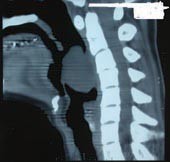Peer Reviewed
Feature Article Gastroenterology
Globus pharyngeus and an approach to dysphagia
Abstract
Globus pharyngeus and dysphagia can cause much anxiety for both patients and physicians. Exclusion of underlying malignancy and reassurance are important aims when managing patients with these conditions.
Key Points
- Dysphagia is a common and frustrating clinical problem that can lead to secondary manifestations equalling or exceeding the importance of the original swallowing disorder.
- In addition to screening for possible malignancy, the history should help to distinguish oropharyngeal from oesophageal dysphagia and to differentiate structural from functional causes.
- If implemented in a timely and effective manner, the management of dysphagia can improve patients’ overall health and quality of life and reduce nursing and other caring costs.
- Although benign, globus pharyngeus can mimic a variety of organic disorders such as upper aerodigestive tract or oesophageal malignancy.
- Investigations form a large part of the management of globus pharyngeus; exclusion of other pathologies and patient (and doctor) reassurance is central in its treatment.
Purchase the PDF version of this article
Already a subscriber? Login here.

